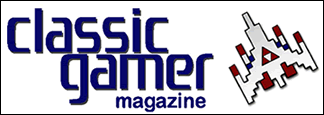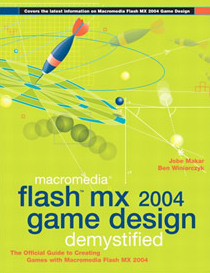 If you love playing games as much as I do, and if you love classic games especially—from the Atari 2600, NES, Sega Genesis, Nintendo 64, etc.—then you might want to take a look at the latest issue of Classic Gamer magazine, available absolutely free as a downloadable PDF file. The editors have done a fine job of putting together another enjoyable magazine packed with articles, screenshots, editorial comment and history about games, new and old. Click.
If you love playing games as much as I do, and if you love classic games especially—from the Atari 2600, NES, Sega Genesis, Nintendo 64, etc.—then you might want to take a look at the latest issue of Classic Gamer magazine, available absolutely free as a downloadable PDF file. The editors have done a fine job of putting together another enjoyable magazine packed with articles, screenshots, editorial comment and history about games, new and old. Click.
For anyone who enjoys games and has ideas about creating their own, a great place to start is a development environment like Macromedia Flash or Director where you can quickly get something moving around on the screen with a minimum of effort. With this approach you can focus on making the game fun to play rather than having to worry about building an infrastructure first. And there are a lot of good books out there to get you started.
 I've been spending a lot of time lately reading a book—by Flash and games guru Jobe Makar—called "Flash MX 2004 Game Design Demystified." The book is an excellent source for anyone interested in designing and building games in any environment. Jobe discusses highly relevant game development topics such as: trigonometry, vectors, basic physics, collision detection and reaction, tile-based worlds, isometric worlds, level editors, artificial intelligence, game graphics, sound, and even some multiplayer game issues. He presents it all in language that is easily understood and that requires no prior knowledge or background with the material. The book contains a CD-ROM with many Actionscript (2.0) code examples that are used throughout the book. There are even files included with expanded concepts covered in the book for more advanced readers, and to keep the pace moving along. It is an excellent resource for anyone just getting started designing and writing games, as well as for those looking to build games using the Flash MX 2004 environment. Highly recommended. Click.
I've been spending a lot of time lately reading a book—by Flash and games guru Jobe Makar—called "Flash MX 2004 Game Design Demystified." The book is an excellent source for anyone interested in designing and building games in any environment. Jobe discusses highly relevant game development topics such as: trigonometry, vectors, basic physics, collision detection and reaction, tile-based worlds, isometric worlds, level editors, artificial intelligence, game graphics, sound, and even some multiplayer game issues. He presents it all in language that is easily understood and that requires no prior knowledge or background with the material. The book contains a CD-ROM with many Actionscript (2.0) code examples that are used throughout the book. There are even files included with expanded concepts covered in the book for more advanced readers, and to keep the pace moving along. It is an excellent resource for anyone just getting started designing and writing games, as well as for those looking to build games using the Flash MX 2004 environment. Highly recommended. Click.





That book is excellent! I have a copy of it myself and love it.
Hard to believe that something like the Nintendo 64 is now "classic gaming" - it's worse than music, where we have the 80's is approaching that "golden oldies" era... Be hard to believe the 90's will come to that point. :-)
Hey. i have that book for Flash MX and is very interesting for newbies.
Man, u'r blog is interesting, check my nibbles javascript game, maybe u like it :)
(it have a poor graphic design but it work fine)
http://www.palaueb.com/javascript/puixpop/puixpop.htm
Carlo - my perception of a game "classic" is one that is created of the highest excellence, and one that does not lose popularity over time. With this definition every game system will have its classics, even the Gamecube—Zelda: Windwaker, to name just one.
Marc - I checked out your link but cannot figure out how to start the game. =(
Oh I know, it just seems like yesterday when I picked up my N64 though... What I'm saying is how I can't believe it's been almost 10 years since it's release, and the fact that things like the SNES are now what we used to consider the NES - old. :-)
I think it's the steep technology curve we're on that makes things age in such short periods of time.
Jay you are the bomb!
i like good games because i am board
Hi Jay, I'm planning on buying the book and I
just want to know if the isometric chapters
include scrolling algorithms and source code for
an iso world level editor.
Thank you.
Hi Carlo - The isometric chapters, as well as most of the chapters in the book, give only a brief introduction of each concept, therefore it does not go into the depth that you are looking for. Still, it's a good book for anyone who is interested in an introduction to game programming with Flash.
Rom - Hi im just wondering before I get the book, does it teach you what codes to use to make a game like "The Legend of Zelda: Ocarina of Time" ? Like does it tell you how to make a guy move around on the screen, get out a sword...etc everything zelda does? Please reply as soon as possible. Thanks
No, it does not.
Update